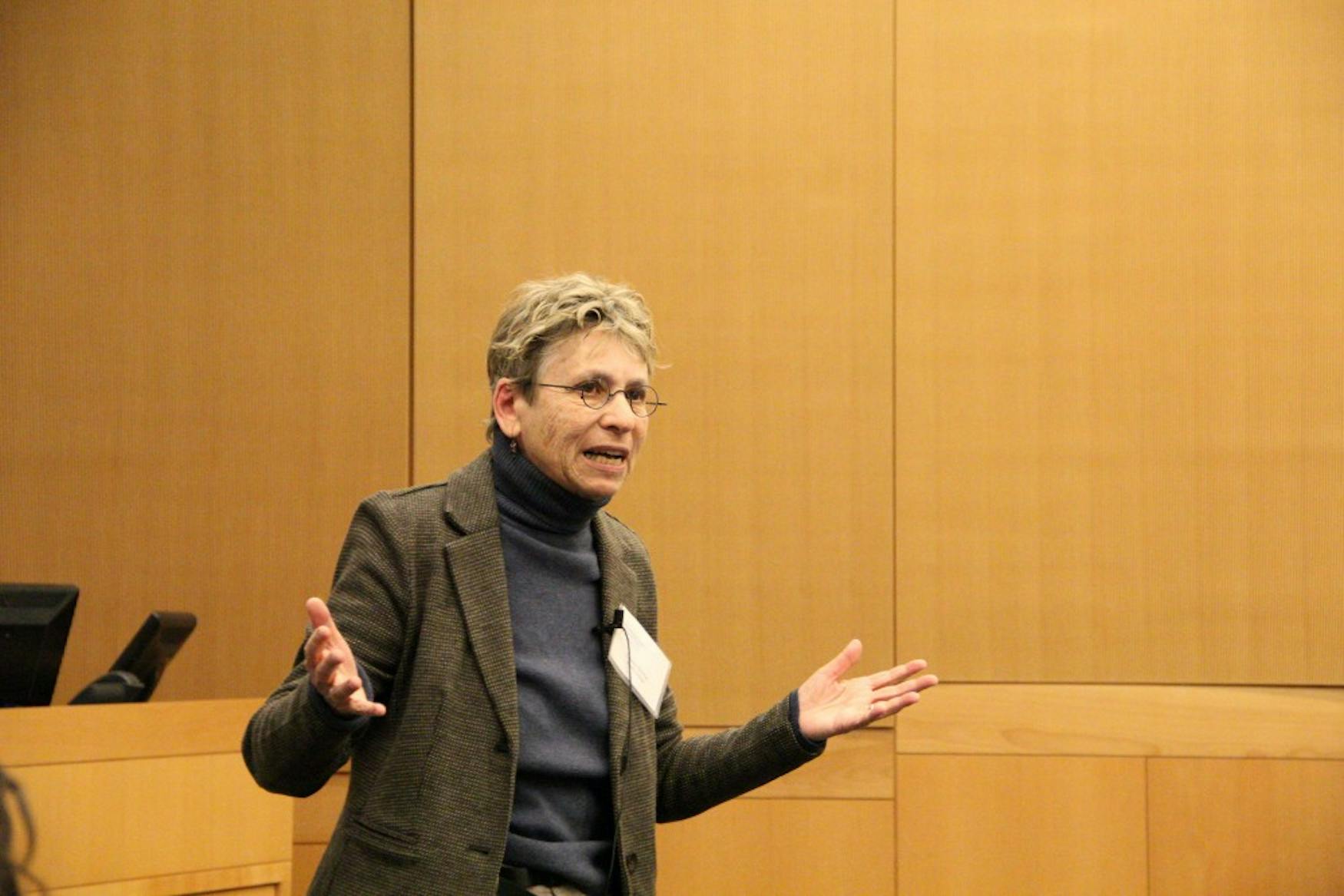Professors speak on issues in Gaza
“Most of you have never lived in a war zone,” said Prof. Ilan Troen ’63 (NEJS), who spoke at the Gaza teach-in on Sunday. The Schusterman Center for Israel Studies hosted this teach-in with lectures concerning the conflict between Israel and the Gaza Strip and the rising Boycott, Divestment and Sanctions movement.
Troen, who is the Stoll Family chair in Israel Studies, director of the Schusterman Center for Israel Studies expressed how, having lived in Israel, one has to deal with the reality that many houses have to have their own bomb shelters. He said that he noticed how students who have never lived in Israel or other war zones view war with a measure of “abstraction,” as they have only heard about wars in terms of historical events and theories.
During his lecture, Troen pulled up a political cartoon that depicted a member of Hamas in negotiations with Israeli Prime Minister Benjamin Netanyahu, in which United States Secretary of State John Kerry is depicted as asking Netanyahu if he could “at least meet him halfway,” ignoring the demands the Hamas terrorist is holding up that says “Death to all Jews.” Troen said that he felt that this cartoon “suggests the limits” of any negotiating between Hamas and Israel because there is often no clear halfway point in Hamas’ demands.
In the past, Hamas’ demands have included an open border, free passage by sea and the ability to have their own airport, Professor Donna Robinson Divine of Smith College said later on. She added that, other than how Hamas has continued to perpetrate violence against Israel, all of the aforementioned demands would be considered legitimate.
Divine then took the podium to discuss the Israeli and Palestinian political landscape, both historically and in the present day. She described how the Palestinians were completely dependent on sympathetic nations like Jordan and Egypt during the 1948 Arab-Israeli War; it was Jordan that ended up capturing the West Bank, while Egypt captured the Gaza Strip.
During the 1950s and 1960s, the Palestinians relied on Arab nations to establish bases, help them cross the border and to allow them to use those countries’ training grounds. The Palestinians predominantly used guerilla warfare during this period, she noted. It was also through the help of their allies, Divine said, that the Palestinian Liberation Organization was founded in 1964 with the purpose of “liberating” Palestine.
Divine also discussed the history of Hamas. Hamas, she said, was founded in the 1980s as a Palestinian offshoot of the Egyptian Muslim Brotherhood. The organization reached the peak of its power in 2012 and 2013 when, with the help of the Muslim Brotherhood, Hamas strengthened its arsenal of rockets and its capacity to produce its own rockets across the borders, she said. However, President Abdel Fattah el-Sisi of Egypt began to cut Hamas off, closing off its supply line, which resulted in a decline of power, according to Divine.
When Professor Emeritus of English at the University of Illinois Cary Nelson, the author of The Case Against Academic Boycotts of Israel, took the podium, the conversation focused on the BDS movement.
The BDS movement is a global campaign that began in 2005, according to its website. The movement has focused on returning “dispossessed” land in the West Bank to Palestinians. The movement also encourages participants to boycott Israeli universities, accusing the institutions of preventing scholars from visiting Palestinian universities as well as assisting in the “occupation and oppression of Palestinians,” according to the official statement of an offshoot of the group called Anthropologists for the Boycott of Israeli Academic Institutions.
The movement, according to Nelson, has been very vague on its key issues. For instance, he pointed out that the movement asks to return Palestinian land to Palestinians; however, Nelson asked which lands are considered Palestinian land. He discussed how the Israelis initially legally purchased land from the Palestinians and asked if this land is considered Palestinian as well.
The movement, has condemned “institutional silence,” or silence on the part of any institution, including universities, when discussing the Israeli and Palestinian conflict, said Nelson.
Nelson asserted that BDS’ methods of protest, including forbidding faculty members to write recommendations for students who plan to study in Israel, as well as the boycott of Israeli universities and academics, would limit communication and “promote hostility, not peace.”
Other speakers at the teach-in included Prof. Leonard Saxe, director of the Cohen Center for Modern Jewish Studies and the Steinhardt Social Research Institute, who spoke in a breakout session titled “Millennial Attitudes Towards Israel.” Brandeis Jewish Chaplain Rabbi Elyse Winick ’86 held a separate session titled “Mapping the Israeli Organizations on Campus.” Finally, Joe Hyams, an MA/MBA student at the Hornstein Jewish Professional Leadership Program and Heller School of Social Policy and Management, discussed the media’s reporting of the conflict between Israel and Palestine and how this has affected views of the conflict.



Please note All comments are eligible for publication in The Justice.